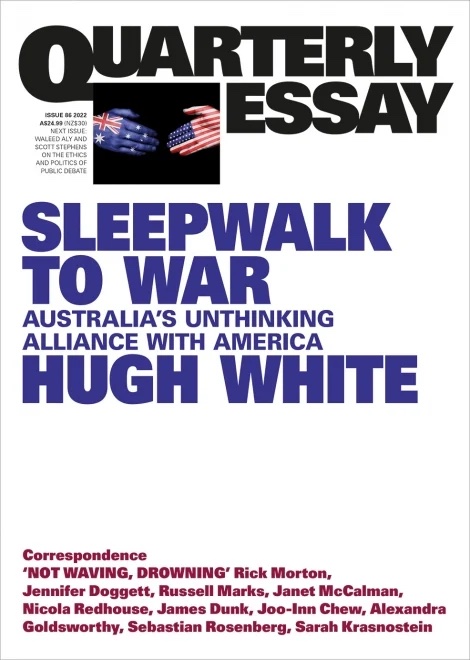
Quarterly Essay: Sleepwalk to War; Australia’s Unthinking Alliance with America. By Hugh White. Black Inc., an imprint of Schwartz Book Pty. Ltd., Melbourne 2022.
Reviewed by Tim Coyle PhD
‘The collapse of Australian relations with China is one of the most extraordinary and consequential events in the history of Australian foreign policy. Just a few yeas ago, China was hailed as our great friend and the key to our economic future. Now political leaders talk openly of going to war with China – the most powerful country in Asia, our largest trading partner and one of the biggest sources of immigrants, with immense armed forces and nuclear weapons.
“Not since we faced imperial Japan in the 1940s have things been so bad between us and a major Asian power. And this is potentially worse, because China today is more formidable and more important to Australia’s future than Japan ever was, since it is swiftly becoming the richest and most powerful nation on earth. This is the simple fact we must learn to live with.’
Have we got your attention?
Hugh White, Emeritus Professor of Strategic Studies at the Australian National University and former Deputy Defence Secretary for Strategy writes these words at the beginning of this essay. No surprises in this as White is a ‘stormy petrel’ in national security circles, attracting equal amounts of praise and criticism. In Sleepwalk to War he does not disappoint. His persistent theme is an Australian independent defence posture, expounded in his 2019 book How to Defend Australia (La Trobe University Press).
White avoids the prickly force structure issue in the essay, save for a swipe at the nuclear submarine program, and concentrates on the dangers of continuing to rely on the US, particularly as regards whether we should support the alliance if the US engages China over Taiwan. In brief, China has emerged from the ‘century of shame’ and is a world power seeking regional hegemony. The US, predominant power in the western Pacific since World War 2, opposes China’s ambitions, exemplified in Taiwan. China is determined to win Taiwan back, by force is necessary. The US Congress 1979 Taiwan Relation Act promises to equip Taiwan for its own defence but not to actively engage; in other words, a ‘strategic ambiguity’. China wants the US out of the Asia-Pacific and if it moves on Taiwan would the US fight the now peer-level Chinese PLA? If it does the war would make Ukraine look like a police action; the region and the world (including Australia) would be economically devastated, and Taiwan would likely be largely destroyed. If the US supplies arms but does not engage, China would win, and the US regional standing would be irretrievably emasculated.
So where does Australia stand? Would the US expect Australia to supplement US forces in a China-US war over Taiwan? Surely the ANZUS treaty shouldn’t be a reason to do so as the partners only agree to ‘consult’ in the event of any partner being attacked. And if the US does leave the region, will they still be our ‘great and powerful friend?’
These are the argument White posits. The US, like all countries, will always look to its own interests. White doesn’t raise the issue of internal US divisiveness but does mention the real possibility of isolationism – the Trump administration signalled this quite strongly. Unlike many commentators who clearly articulate the dangers but don’t provide the solutions, White advocates a forthright Australian approach to the alliance by speaking frankly to the US about Australian limitations and expectations regarding any involvement in the Taiwan Strait and to focus on our legitimate regional interests in the South Pacific.
Prime Minister Curtin’s ‘look to America’ speech of 1942 followed the Singapore debacle resulting from the failure of Britain’s Far East policy based on a ‘fleet to Singapore’ in which inter-war Australian governments put their faith. America was there and has remained our ‘great friend’ ever since. But in a failure over Taiwan, either through strategic ambiguity or military defeat, causing a peremptory US regional withdrawal, there will be no other powerful friend to look to. We will have to stand on our own resources, and it isn’t too much to say that this will be the first time since the beginning of colonial Australia in 1788.
The People’s Republic of China is an authoritarian state which the Communist Party rules with an iron fist. The regime is repugnant to western liberalism and democratic principles. But the PRC exists and any wishful thinking about internal revolution and economic collapse is fanciful. The West imagined the emergence of hundreds of millions from poverty and the wide-open economic opportunities under the ‘one country –two systems’ policy would bring political and liberal changes to China. How wrong we were (and we made the same mistake over Russia). So, we must swallow our deluded notions that ‘China has changed – not us’, ‘we don’t have to choose between China and the US’ and even the sacred ‘rules-based order’. The PRC cocks a snoot at these treasured western values because it can. And don’t let us continue to talk about ‘containing China’. Inane political statements such as ‘it would be inconceivable for Australia not to support the US in an action over Taiwan’, ‘red lines’ over Chinese bases in the South Pacific and ‘drums of war’ references have hopefully been banished to political obscurity.
The US alliance is a critically valuable arrangement for many reasons; however, while acknowledging this, White advocates a mature re-assessment of its implications preferably well before it is severely tested in a confrontation over Taiwan.
This Quarterly Essay is essential reading.



